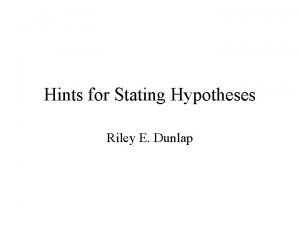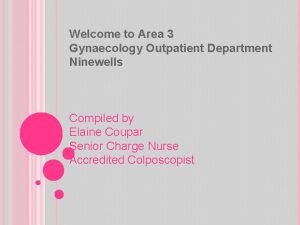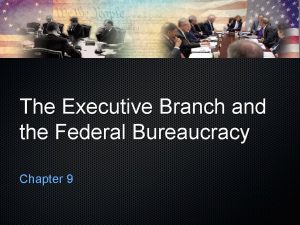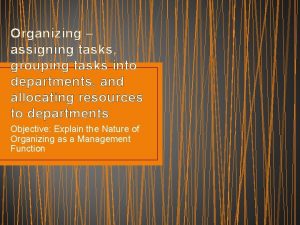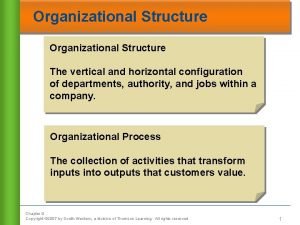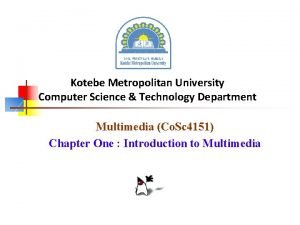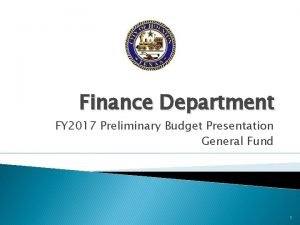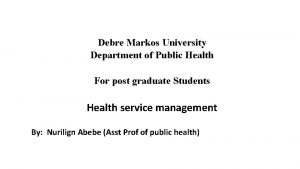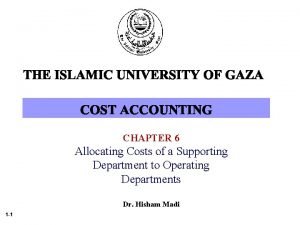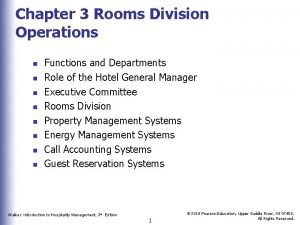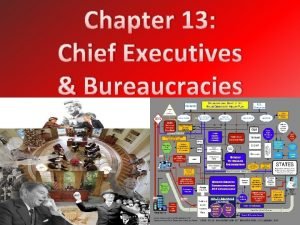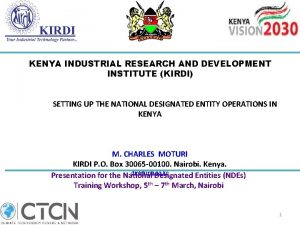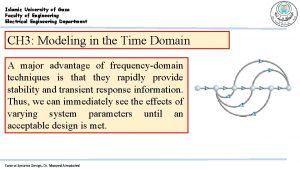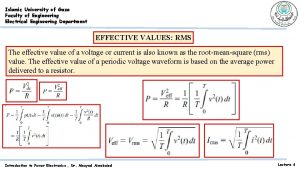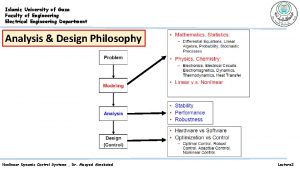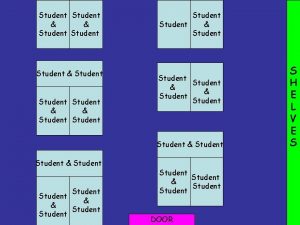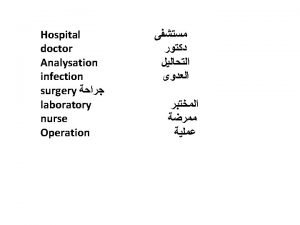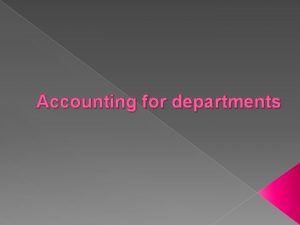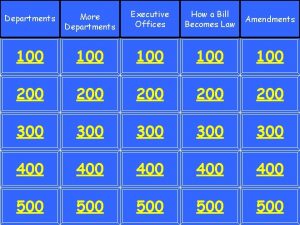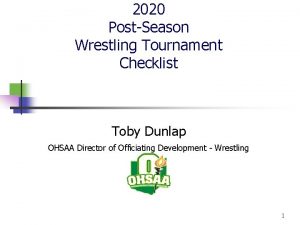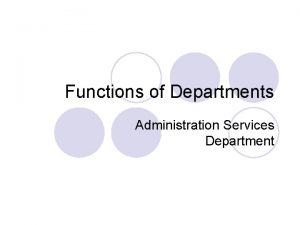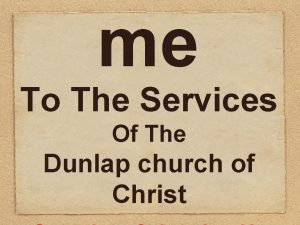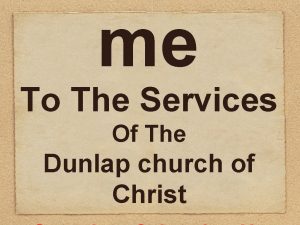Dunlap Student Services 2020 Dunlap Student Services Departments



















- Slides: 19

Dunlap Student Services 2020

Dunlap Student Services Departments ● ● ● ● Special Education Ages 3 -21 - Emily Barnes/Amy George (Pathways) Counselors-Jen Dando ESL- Sarah Urbanc Speech Pathologists- Alyssa Hart Motor- Alyssa Hart Psychologists/Social Workers- Alyssa Hart Nurses- Alyssa Hart Vision/Assistive Technology- Denise Jefferson

Special Education Pre-K Elementary Middle School High School

Pre-K ● 3 classrooms total: 1 Dunlap Blended/Bright Futures (Grant Funded), 2 EC selfcontained Special Education classrooms ○ ○ ● ● ● Blended/Bright Futures AM & PM sessions are full with a total of 20 “Bright Futures” students and 10 students with IEPs. The 20 “Bright Futures” students went through a screening, and they are considered “At-Risk” As of 12/20/19, there are 27 Dunlap ECSE students enrolled (plus 3 Brimfield students), where there a total of 40 spots. Three children have been through a play-based assessment with eligibility meetings in Jan 2020, and an additional six children are on the play-based referral list. All Pre. K classrooms have AM and PM sessions All children must go through a screening process and be found eligible for our programs All preschool programs will be run by Dunlap CUSD #323 hired staff starting the 2020 -2021 school year!

Cross Categorical Who are we? ● Elementary ○ Becky Hopkins ○ Sheri Eppel ○ Teresa James ○ Allison Chan ○ Rachel Klein ○ Nicole Sivertsen ○ Kathy Hannah ○ Alison King ○ Nicole Hirsch ○ Megan Brintlinger Who are we? ● ● DVMS & DMS ○ Andrea Bybee ○ Maggie Lucas ○ Randi Oehlke ○ Deb Pendleton ○ Joe Bohannan ○ Molly Stinauer DHS ○ Heather Benway ○ Kevin Dulin ○ Carol Nepolello ○ Theresa Seibert ○ Paige Reeser

Cross Categorical What do we do? ● ● ● DHS- Co-teaching support in general education classes - 28 classes currently cotaught Pull out support, push in support, and small group instruction - all depends on students IEP and need Adapts curriculum and provides accommodations and extra support to students with disabilities Study skills and homework support in smaller study halls Address student skill deficits by providing targeted interventions Write, manage, and facilitate student IEP meetings and paperwork

Instructional/Resource Who are we? ● ● ● Nicole Ratcliff (RES) Holly Webster (RES) Adam Collins (DHS) Rachel Williams (DHS) Christine Hill (DVMS) Carrie Jordan (DMS) What do we do? ● ● ● RES- K-2 and 3 -5 self-contained classroom DMS/DVMS - 6 -8 self contained class DHS Alternate curriculum within a special education classroom. approximately 12 classes offered each year Supports students 2 -3 grade levels below academic, who may also struggle with functional skills Address student skill deficits by providing targeted interventions Write, manage, and facilitate student IEP meetings and paperwork

Life Skills Who are we? ● ● ● Lacie Kiesewetter (BES) Abigail Voelker (BES) Amy Ruwe (BES) Shannon Steffen (DMS) Amy Windsor (DMS) Sara Mc. Elroy (DHS) What do we do? ● ● Unique curriculum designed around IEP goals and functional skills Curriculum addresses daily living skills such as shopping, cooking, hygiene, etc. Community experiences integrated into the curriculum. Write, manage, and facilitate student IEP meetings and paperwork

DHS- Pathways classes are currently taught by Amy George. ● Services Provided: ● ● Post-Secondary program designed to meet the needs of students with IEPs who have finished high school, but still need an opportunity to develop vocational and community living skills. Pathways students are 18 -22 years old. ● ● Community Living skills - shopping, schedules, leisure, public transportation, volunteer experience Vocational Skills- Positive work behaviors, completing tasks to expectations, self advocacy and decision making Independent Living Skills - cooking, cleaning, home management Many students will go to group homes or supported living apartments. The goal is to provide enough vocational and community based instruction that students leave us with the skills they need to live or work as independently as possible.

Counselors Who are we? Elementary ● ● ● May Abouhouli- WW Jen Dando- RES Katlyn Thompson- HGES Jody Centers- BES Kate Mills- DGS DVMS ● Terri Patterson DMS ● Angela Zumbek DHS ● ● ● Kim Klokkenga Scott Goley Celia Love Michelle Mathis Ashley Seanor

Counselors cont. What do we do? ● ● ● Handle a wide range of social and emotional issues Support students with peer relationships-making & keeping friends, acclimating new students to the school, handling conflict Provide students with behavioral support to help them be successful in school Support for family changes--Divorce, deaths, relocation, medical issues, etc. Provide mental health education to staff Provide students with their basic needs during school day such as running breakfast clubs or providing clothing ● ● ● Provide classrooms with social-emotional learning support. See students in a smaller, more individualized setting to help meet a specific need. When a student has a very specific need, counselors will at times see them individually. Upper elementary students may also refer themselves to see counselor. oversee all 504 Plans in their school buildings. Facilitate the Response to Intervention process when it comes to behavioral support Serve as change agents, to ensure each student has the same opportunity for success regardless of ethnicity, gender, intellectual ability, race, religion, or socioeconomic status.

English as a Second Language Who are we? ○ ○ ○ ○ What do we do? Amelia Miller Marissa Lofgren Katie Norbutas Sarah Urbanc Monica Polk Maisoun Mohamed Tetyana Ovsienko *Team has earned 12 masters degrees and 1 doctorate on top of their ESL/Bilingual endorsements! ○ ○ Advocate for student and family rights Assess and support English language development Honor students’ native languages by helping to make connections between it and English through the use of culturally relevant teaching methodologies Assist in the accommodation and modification of classroom and assessment content/material

ESL Demographics 2016 2017 2018 2019 2020 4461 4591 4513 4527 4634 893 994 972 1, 057 1, 179 20% 22% 23% 25% Number of Languages 49 51 46 49 49 ESL Students 247 264 283 277 312 Immigrant Funding 170 185 181 208 225 District Enrollment Language Other than English

Speech Language Pathologists Full Time: ● ● ● Kay Lynn Trilikis (HGES) Jen Koch (RES) Leanne Lorts (WW) Hope Hamm (HGES) Kristen Capati (BES) Part Time: ● ● ● Jamie Long (BES) Amanda Hewerdine (DGS) Jamie Jaegle (DHS) Heather Michelini (DMS) Melissa Grandsart (RES, DVMS) Prudence Mortoti (DMS)

SLPs continued Who do we work with? ● 450 students from the ages of 3 -21 years old ● These students may have difficulties in any of the following: ○ Articulation ○ Receptive language ○ Expressive Language ○ Pragmatic language (social skills) ○ Fluency (stuttering) ○ Voice (Vocal quality, pitch, volume) ○ Augmentative/Alternative ○ ○ Communication Phonological Awareness Processing (language or auditory) What do we do? ● ● ● ● Prevention of communication disorders Identification of students at risk for problems Assessment of students’ communication skills Evaluation of the results of comprehensive assessments Development and implementation of IEPs Administering therapy to students on the caseload Response to Intervention Progress monitoring /documentation Training of classroom staff on student abilities and needs Collaboration with teachers, therapists, and professionals Participation in research or presentations Supervision of graduate students or clinical fellows Participation in school wide curriculum or literacy teams Autism diagnostic team Play-based assessments

Motor Team ● ● ● ● Who we are: OT- Natilie Kelly PT- Stacy Good PTA- Elaine Carter COTA- Sarah Lamb COTA- Kristi Cochran COTA- Jordan Mc. Intyre Adapted PE- Becky Gohs What we do: ● OT ○ ○ ● PT ○ ○ Increased time for collaboration and training to implement sensory approaches Frequent check-ins and creation of visual models for student success Increased time for equipment evaluation and set up Streamlined electronic note taking/communication system ● Adapted PE ○ ○ Weekly check-ins with PE teachers to prepare for upcoming lessons Modifications to increase student engagement

Psychologists/ Social Workers ● Who are we? ○ Brittney Allen & Jeff Vacca ■ HGES, BES, DMSS ○ Karen Conlon & Megan Tracy ■ WW, DGS, DVMS ○ Evan Pavlik & Tiffany Hurt ■ RES & DHS ● What do we do? ○ Support students' ability to learn and teachers' ability to teach. They apply expertise in mental health, learning, and behavior, to help children and youth succeed academically, socially, behaviorally, and emotionally. ○ Assessment, consultation, prevention, intervention, staff/parent/student education, research, program development, mental health care, advocacy, inservices, counseling, report on evaluation results, IEP team member, serve as LEA, attend IEP and Rt. I meetings.

Nurses Who are we? ● ● ● ● ● Amy Cranford Hillary Boles Laura Burdett Maureen Colvin Lisa Gassman Laura Lee Michelle Mc. Donald Steve Mocilan Marta Watts What do we do? ● ● ● ● ● Manage diabetes care Provide nutrition through feeding tube Urinary catheterization Administration/supervision of medication Assess and provide care of staff/students in medical situations Maintain student health records Verify immunization compliance Ensure compliance health policies and procedures Direct staff trainings TOTAL MEDICAL VISITS THIS SEMESTER: 14, 312 Our schools currently have 454 students diagnosed with potentially life threatening medical conditions, such as Asthma, Epilepsy, Diabetes, Food Allergies, etc.

Vision/Assistive Technology Denise Jefferson provides all vision and assistive technology services in Dunlap. ● ● Students have a range of visual conditions including achromatopsia, ocular albinism, stargardt’s macular degeneration, multiple impairments and cortical visual impairment (CVI). A student’s IEP team must consider assistive technology at all IEP meetings and provide parents/guardians with this information and a telephone number and an internet address for the Assistive Technology Program. Services Provided: ● ● ● ● ● Provide direct service to students Provide in-service to staff regarding impact of vision loss in the classroom Teach Braille Collaborate and consult with classroom teachers, paraprofessionals, and related services Adapt materials Write reports Prepare for & attend IEP meetings Respond to software issues & equipment malfunction Perform and write annual reports on Functional Vision Assessments/Learning Media Assessment Dunlap recently purchased Don Johnston tools for ALL students to benefit from
 Riley e. dunlap
Riley e. dunlap Kaitlyn dunlap
Kaitlyn dunlap Wolaita sodo university departments
Wolaita sodo university departments Ninewells gynaecology assessment unit
Ninewells gynaecology assessment unit What are the 15 cabinet departments
What are the 15 cabinet departments Grouping tasks into departments description
Grouping tasks into departments description Vertical and horizontal organizational structure
Vertical and horizontal organizational structure Kotebe metropolitan university website
Kotebe metropolitan university website Accountability quotes for work
Accountability quotes for work Finance departments
Finance departments 15 departments
15 departments Debre markos university departments
Debre markos university departments Step down method
Step down method Introduction of room division
Introduction of room division Executive departments definition
Executive departments definition Today's public relations departments:
Today's public relations departments: Kirdi logo
Kirdi logo Should universities departments engineering
Should universities departments engineering Should universities departments engineering
Should universities departments engineering Should universities departments engineering
Should universities departments engineering
